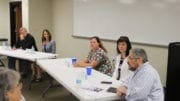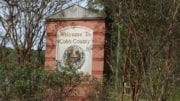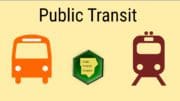Jerica Richardson is a Democratic Candidate for the Cobb Count Board of Commissioners District 2 seat. She’s hoping to be the Democratic nominee in the race to replace incumbent Republican Bob Ott, who is retiring after his current term ends.
The Courier held a conversation with Richardson recently.
Background
Asked to tell us about her background, Richardson said, “I’ve been in Cobb County since 2005.”
“I actually came up with Hurricane Katrina from New Orleans,” she said. That’s just a part of my story. That was an interesting time. I was still in high school. And it was just interesting to see how everyone responded to that situation.”
“Whenever there’s a tragedy or some kind of traumatic event, there’s a lot of fear that exists,” she said. “And sometimes it can lead to people … saying things that can be very divisive.”
She said that people at her mother’s workplace helped her family adjust to the new surroundings.
“They adopted our family and showered us with things so that we could have a place to live and a place to sleep,” she said. “And it was just really incredible because they were touched by our story, by the relationship that they built. And for me it just represents what it means for a place to be home.”
“And the idea is that you can overcome any kind of fear and any kind of division by connecting through empathy, through understanding other people, and understanding how we can all work together to accomplish something. So that is where ‘Connecting Cobb’ comes from.”
She said that divisive rhetoric makes it hard to make decisions, and that different communities in the county, and in District 2, often are separated.
“Even within District 2 … there are these unknown spots of incredible diversity and innovation that exist, that are just unknown to the rest of the community,” she said. “And so by bringing those groups together and bringing the sentiments together and the initiatives and the thoughts, and the innovation, I think that we can accomplish great things with the county.”
“I actually sat on the SPLOST board for for education recently, and got a chance to see it up close and personal, just how divided our internal governing agencies are,” she said.
“Why would a school board member be a part of a commission meeting? Well, because the decisions relate to one another,” she said.
“How do you zone for schools, and how do you zone for residential areas? (It) has a great impact and the assumptions that you’re making on who can live where,” she said. “All that stuff is interrelated, and if there is no relationship that goes beyond a friendly relationship, but one that’s working and operational and collaborative top-down, it’s always there.”
Reason for running
The Courier asked Richardson why she is running for District 2 BOC commissioner.
“I had encountered the Board of Commissioners, and most of what I had known about was around zoning and transportation projects and some of the ordinances in the county,” she said. “But when I looked at this position, and really understood the capacity for change that is within the role, it was inspiring.”
“To be frank, (if) you look at some of the issues that we face in the community (and in) the different areas, you’ve got issues like Sterigenics, you’ve got issues like cityhood, you have issues around transportation, and how different communities get invested into, and how different groups are listened to and incorporated, or making sure that the community has a voice whenever there’s a large development coming in … the Commission has so much range and so much opportunity to really embody the idea of representation,” she said.
Richardson mentioned the wide range of issues the Board of Commissioners is responsible for, including “police, fire, power, water, economic development.”
“You look at even the what we’re going through right now: the pandemic. I believe in people and I believe in community very strongly, so I know we’re going to make it through. That being said, there’s still going to be a recovery period, we’re still going to have to come together,” she said.
“It’s going to be awkward to go back out on the street,” Richardson said. “But we’re going to have to come back together and figure out how to jumpstart the local economy again.”
“I know that that burdens gonna fall on the local and state representation. Who can drive that conversation better than the county commission?” said Richardson.
Sterigenics
The Courier asked Richardson if she had any thoughts on the controversial Sterigenics facility near Smyrna at the southern edge of District 2.
The Sterigenics plant became a focus of community concern in Smyrna and surrounding areas after an article jointly published by Georgia Health News and WebMD reported that three census tracts, two in the Smyrna area and one in Covington, had unacceptable levels of cancer risk by EPA standards, due to elevated amounts of ethylene oxide in the air.
“I have some very particular thoughts when it comes to Sterigenics,” she said. “I have been following the progression and the bills that have been proposed and what the priorities are.”
“I can say I was definitely in the camp of making sure they were shut down until we figured out testing,” she said.
She said she is supportive of bills proposed by Georgia State Representative Erick Allen to regulate and monitor the use of ethylene oxide in the state.
“I am very much aligned with Eric Allen’s stances, and I do keep in touch with (Georgia State Senator Jen Jordan) as well,” she said. “Because I know she’s been very active on the ground and just making sure that information is transparent for people. So that is someone that I definitely do speak with.”
“The other side of that is, I understand that (Sterigenics) also plays a role within our local economy,” she said.
She said that while she understood the FDA’s pressure that led to the reopening of the facility due to the COVID-19 pandemic, she doesn’t think “the need matches what it is that Sterigenics will be producing.”
Transportation
The Courier asked Richardson her position on transportation.
“I’ve had a chance to speak with different parties,” she said. “If I were to say a beautiful world, the magical world, where resources are unlimited, I think … having a MARTA stop at the Braves stadium, taking us up commuter rail or light rail to the city of Marietta, and tributaries flowing out with trolleys and buses, and widening some of these single lanes as tributaries to the highways, I think that mix helps a lot. I think that is kind of a beautiful idea.”
“(But) when you look at some of the numbers, getting that stuff tomorrow, you’re looking at a lot of construction work: about $300 million a mile at a minimum in order to get it to connect,” she said. “And we also have to look at the fact that the technology is a little bit older.”
“So all those factors play in. Commuter and light rail, while less expensive, it’s still pretty expensive, getting it up to Marietta,” Richardson said.
“Some of the studies that have been floated include BRT (bus rapid transit) with basically the middle lane, the middle dedicated lane, where this particular mode of transportation has a feel and experience that is akin to light rail, but it is not light rail,” said Richardson.
“There are some parties that are like ‘I won’t have a conversation, unless you include light rail,’ and your other parties say, ‘I won’t have a conversation unless you don’t include rail.'”
“I want to have a conversation where all of the options are looked at,” she said. “If you go on my website, you’ll see where I compare the different transit option type and what the benefits are of each one.”
“And then I have a different transportation mix depending on if you’re trying to go from your home to your work or from your home to your job or across counties or within county; different types of transportation goals there,” she said.
“But I want to have a conversation where we look at everything and build something from the ground up,” said Richardson. “So even if we were to look at the current BRT proposals that are being discussed, I would like to see it become a transitional plan.”
“Let’s run a couple of lines in certain areas,” she said. “And let’s use that as a hypothetical route for another form of transportation down the line. So let’s see whether or not there’s usage, what the volume is like, volume and frequency.”
“And if it worked, we just have this phased view,” she said. “Because even if we wanted to do light rail and commuter rail, it would be beyond the four years of my time in the county commission.”
“So I believe we should have a long term plan, and let’s do our best to map it against what the ARC projections are,” said Richardson.
Land use and zoning
Land use and zoning issues take up a large amount of the schedule of the Cobb County Board of Commissioners. The Courier asked Richardson if she had a particular approach or philosophy to zoning issues.
She said that while zoning has to be handled on a case-by-case basis, she has an approach to working with the community on those issues.
“My thing is always to ask what’s driving the motivation. I don’t like to just ask you what you want, and when you want (it) … And what are you afraid of? Because a lot of times it’s that,” she said.
“I always like to look at what the motivations are,” she said. “Because that’s usually how you get to a real answer. I always say you fall in love with the problem, not your solution.”
“I would definitely like to be proactive in meeting with those groups ahead of time,” she said. “It’s a general guideline. They’re so diverse, those zoning questions that come up.”
Public Safety
Asked about public safety, Richardson said she believes in “the three P’s” of public safety: pay, presence and partnership.
“Good public service is not charity,” she said. “I believe in paying proper compensation.”
“What I had conversations (about) with some of our leadership was … kind of shifting your narrative. From the idea of ‘protect and serve’, to ‘being protected and serving your sense of community’,” she said.
“And I say that because everyone needs to feel safe.” she said.
She said there are groups of people who feel unsafe because of an uptick in crime, and also groups that feel mistreated.
“There’s a lack of feeling of safety there, too,” she said. “I believe in really fostering that sense of community, and that’s a much deeper conversation.”
“The other side to this is a housing question,” she said. “We have a lot of public servants that don’t live in the county. And that’s not a fault of their own.”
She said the affordability of housing was the issue.
“I have seen people that are working multiple jobs in addition to being on SWAT, just to make ends meet,” she said. “And that’s unfortunate, that’s hard. That’s difficult. That’s a lot to ask for, to make that kind of move.”
“There are some affordable housing initiatives that I’m looking at. They are very different from the models that are currently on the books right now. It’s not the idea of creating just this one mega-complex where it’s cheaper, because I believe in choice,” she said.
She said that not just the police, but firefighters and teachers should be able to truly integrate into the community.
Concluding thoughts
Asked if she had any concluding thoughts she wanted to tell voters, she said, “I’ll tell you my pillars, my driving pillars, and maybe that can help set a framework.”
“I talked about ‘Connecting Cobb’,” she said. “It’s a nice vision, a nice idea, there’s some cool things that we can get from it.”
“And there are three pillars that I have for that, which all different policy issues fall underneath,” she said.
“One is empowerment. One is innovation, and wanting to live work, play.” she said.
“Empowerment is not just a talking point, it’s not just a word that’s out there because a lot of people use that word very frivolously,” she said. “But when you want to empower something, or someone, there’s two things that you have to commit to.”
“One is the idea of transparent and accessible information. You have to make sure that people can readily have access to that information,” she said.
“And the second piece is that you have to make sure that there is an avenue by which people can share their opinions, experiences, and stories,” said Richardson “If you don’t do those two things, then you’re not serious about empowerment.”
“The second part is innovation,” she said. “And innovation is how we look at our problems.”
“That goes to those questions that we ask and how do we ask those questions?” she said. “How do we make sure that we’re thinking about things outside of the box and constantly asking whether or not we’re really solving the problem.”
“And the only way to do that is through empowerment, making sure that those voices and those stories are at the table so that you can actually consider them properly,” she said. “And when people come together, it’s a magical thing that happens, but you wind up coming up with much more comprehensive ideas that have less negative unintended consequences.”
“The third aspect of the platform is live, work, play. This is what we want to accomplish. We want a place where you can live, work and play in Cobb County, that you can feel safe,” Richardson said, “and that you can feel has stability.”
“I want people to feel empowered. I want them to feel that their opinions and thoughts are considered, and I want them to feel like they can go and become what it is that they envision: the American dream, right?”
“We’ll call it the Cobb Dream,” she said.
“But live work play is really the end goal. And I want to do that with everybody,” she said. “Because I can’t do that without everybody. I haven’t lived everybody’s life. I haven’t worked every job and I haven’t lived in every neighborhood. I rely on the community to work together to build that vision out.”
For more information on Jerica Richardson’s campaign visit her website at https://www.jericaforcobb.com/





